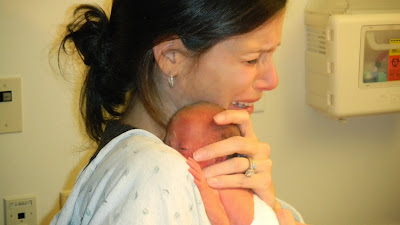Every mother and father is familiar with the ups and downs of pregnancy and parenthood. For the parents of premature infants like Alyssa and Sam Robb, however, that understanding is amplified. The Robbs, who have been married nine years, always knew they wanted children. In 2007, they were thrilled to learn that they were expecting—but then the unthinkable happened.
“I was 22 weeks pregnant with our daughter, Logan, when I started having complications,” Alyssa explains. “Everything had been fine, but I developed a uterine infection that would have forced me to deliver her at a time when she just wasn’t viable yet.” They made the incredibly difficult decision to end the pregnancy.
By 2009, they were ready to try again. Through in vitro fertilization, they were soon pregnant with twin boys, Baylor and Hudson. Although excited, Alyssa remained cautious, aware that multiples, her age, and her past experience put her at high risk for premature birth. In fact, more than half of all twins are born at less than 37 weeks gestation, according to the National Institutes of Health.
“I had never been so scared in my life,” she admits. “I thought, ‘Here we go again. We’ve lost them.’“
An immediate trip to Magee revealed that Hudson and Baylor were just fine, but Alyssa was put on modified bed rest for placental abruption, a separation of the placenta from the wall of the uterus. During the next four weeks, she went to the emergency room eight more times for bleeding, and was admitted four times.
Eventually, the situation became critical. Over Thanksgiving weekend, Alyssa experienced a large bleed at the hospital. Although the doctors tried to prevent labor, Dr. Simhan had no choice but to deliver the boys in an emergency Cesarean section. It was November 28, 14 weeks before the twins’ March due date—and the original due date of the Robbs’ late daughter, Logan.
“Dr. Simhan talked to me the whole time, and I heard him talking to Hudson and Baylor, too: ‘Come on buddy, let’s go,'” Alyssa remembers. “He saw Hudson’s eyes open when he was delivered, and that’s something that’s really special to me now.”
As the boys were wheeled away to the neonatal intensive care unit, the Robbs marveled at their size: Hudson was 2 pounds, 6 ounces, and Baylor weighed just 2 pounds, 2 ounces. “I thought, ‘Oh, they’re tiny, but they’ll be fine,’” says Alyssa. “In retrospect, I think my brain was protecting me from reality.”
The fact is that premature infants face a number of challenges, from developmental delays, to vision problems, to breathing difficulties. In the NICU, both boys were intubated and placed on ventilators to help their tiny lungs function.
Just two days later, doctors came to Alyssa’s room with devastating news: Hudson’s lungs collapsed when he was extubated. Although he had stabilized, he was critical. Sam and Alyssa, who was still recovering from a blood transfusion, rushed to his side.
“All of his systems had started to fail,” says Alyssa. “They suspected a brain bleed and had taken him off the ventilator but were still giving him oxygen. We asked the doctors to stop. We couldn’t let him suffer.”
An hour later, Hudson died in his parents’ arms.
It’s a tragedy that many people would find insurmountable. But the Robbs knew that, despite their immense grief, they had to be strong for Baylor. It was almost three weeks before she and Sam could hold Baylor, but when they finally did, their connection to him grew even stronger. “I just sobbed,” says Alyssa. “It was just pure love and joy.”
 |
| Alyssa holds Baylor for the first time. |
Seventy-five days later, Baylor was healthy enough to go home with his parents. Although the prospect was initially scary, the Robbs felt comfortable knowing they weren’t alone. “Everyone at Magee was so supportive, and Dr. Simhan was always there when we needed him,” Alyssa says. “They’ve become like family to us.”
Today, Baylor is a “personable and strong-willed” four-year-old who loves to dance, swim and play with Hot Wheels cars. He has no major complications from his early entrance into the world—but the experience has had a lasting impact on his parents. In 2011, the Robbs organized a charity event, raising enough money to help purchase equipment that will aid Dr. Simhan in his research into premature birth.
The experience has also given them perspective on being parents of a preemie. “You have to trust and have faith that you have been given a gift,” says Alyssa. “Even if that gift doesn’t turn out the way that you expected it, it’s still a blessing. Embrace that—and enjoy every moment that you can.”









